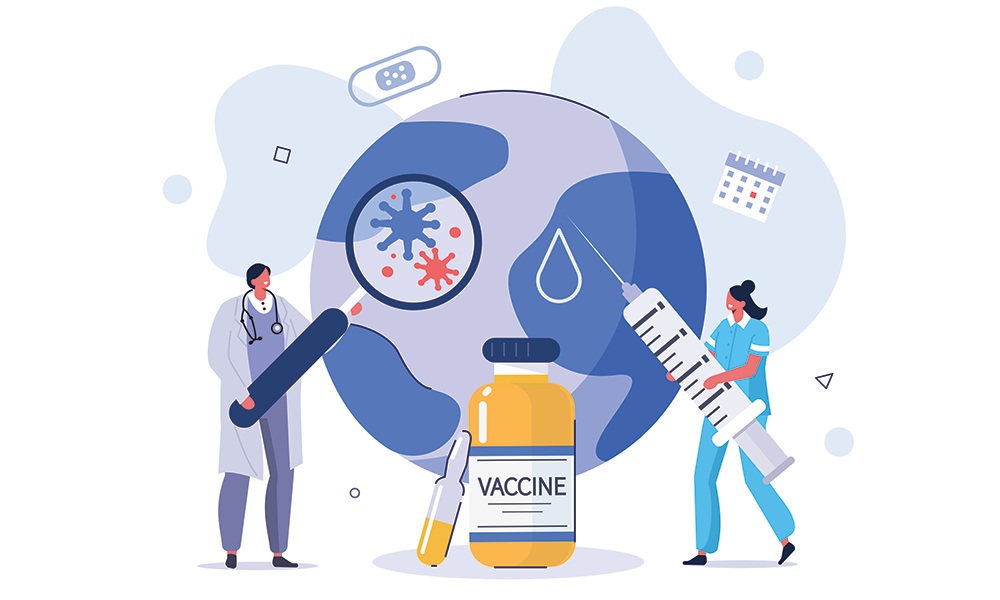
Although vaccines save 4-5 million lives a year, there is still a lot of misinformation that surrounds them.
After seeing the development of the COVID-19 vaccine and the number of false claims that came after it, I found four of the most widely spread statements that were incorrect about vaccines in general and I’m going to explain why they’re not true.
Myth 1 – Natural Immunity is better than Vaccine-Induced Immunity
Natural immunity is the body becoming resistant to a disease itself, however this usually only occurs after it has already been infected and has recovered, learning more about the disease and therefore becoming more resistant to it. The key point to take away from this is that the body needs to be infected first for it to become immune to it. For diseases such as COVID-19, measles or polio, catching the disease likely means that there will be complications after recovery, including prolonged hospitalisation and even death.
On the other hand, vaccine-induced immunity allows the body to perform its natural defence mechanisms to fight against the disease, except that the disease isn’t actually present; the vaccine will typically only have weakened or inactive pathogens from the disease, stimulating the body to activate its immune. In this case, the body will have learnt how to fight against the disease, but without having actually been affected so it will survive without major complications and will know how to fight against the virus in case it does infect them.
Myth 2 – Vaccines contain harmful toxins
While this may be true in some circumstances, it usually isn’t. Many people typically claim that viruses contain substances such as formaldehyde, aluminium, or mercury which would cause harm, but these ingredients are usually only present in such small amounts that they are virtually not present. For example, formaldehyde is used in the production of some vaccines to inactivate viruses or bacteria, but the amount in a vaccine is far lower than what is naturally found in the body or in common foods. Aluminium is used as an adjuvant in some vaccines to enhance the immune response, but again, the amount is much smaller than what is typically absorbed through daily environmental exposure. Mercury, specifically in the form of thimerosal, was once used as a preservative in some vaccines, but it has been largely removed from childhood vaccines as a precautionary measure, even though research has shown that it is safe in the amounts previously used.
Regulatory bodies (such as the MHRA & FDA) ensure that all vaccine ingredients are safe and necessary for the effectiveness of the vaccine, so there typically isn’t a need to worry about harmful ingredients being in them.
Myth 3 – Vaccines aren’t necessary if others are vaccinated
Herd immunity is the idea that when a large portion of a population is vaccinated, disease is less likely to spread. Although this does happen, it doesn’t mean that others can skip vaccination. The more people who skip vaccination, the smaller the portion of the population that is vaccinated, decreasing herd immunity. It is always a good idea to get vaccinated so that you are protected.
Myth 4 – Vaccines cause serious side effects
Any medical intervention can cause side effects, and the same does go for vaccines; but the side effects that occur are typically mild and temporary. Common side effects include soreness at the injection site, mild fever, or fatigue, which usually resolve within a few days. Serious side effects, such as severe allergic reactions, are extremely rare. For example, the risk of anaphylaxis (a type of life threatening allergic reaction) from a vaccine is estimated to be about 1 in a million doses.
Vaccines are always carefully tested in clinical trials to ensure their safety before being approved for public use. Furthermore, after approval, vaccines are continuously monitored for any potential adverse events through systems like the UK’s Yellow Card Scheme and the Vaccine Adverse Event Reporting System (VAERS) in the US.
The risk of suffering from a vaccine-preventable disease far exceeds the risk of any potential side effects from the vaccine itself.
Conclusion
Vaccines are one of the greatest medical advancements in human history, saving millions of lives annually. However to make them as accessible as possible, we should attempt to explain and debunk any incorrect information about them.
– Written By Hamd Waseem